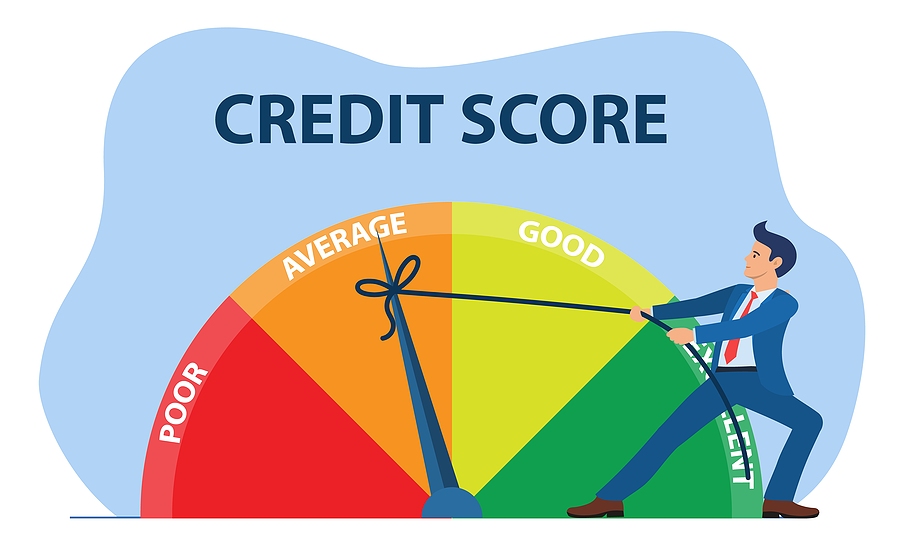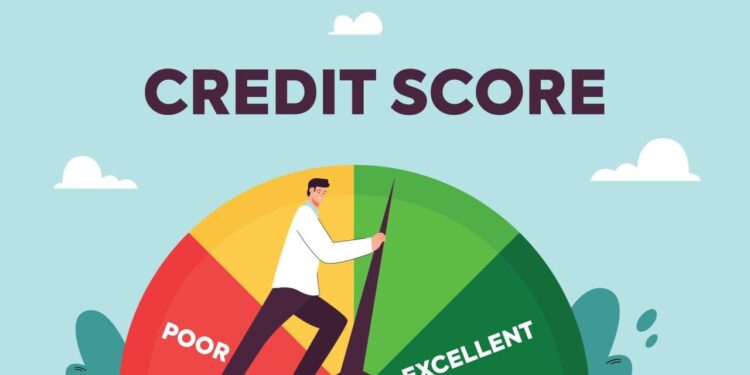What is a Credit Score?

A credit score is a three-digit number that represents a consumer’s creditworthiness. It’s a numerical assessment of the likelihood that you will repay borrowed money. Lenders use this score to evaluate the risk of lending to you.
A. Major Credit Scoring Models
While various models exist, the FICO Score and VantageScore are the two most widely used.
A. FICO Score: Developed by the Fair Isaac Corporation, it’s the most common credit scoring model, used by over 90% of top lenders. FICO scores typically range from 300 to 850.
B. VantageScore: Created by the three major credit bureaus (Equifax, Experian, and TransUnion) as a competitor to FICO. VantageScores also typically range from 300 to 850.
C. Differences: While both models use similar data, their weighting of factors and specific algorithms differ, meaning your FICO Score and VantageScore might not be identical. Lenders might use different versions of these scores, or even their own proprietary scoring models.
B. The Credit Bureaus
Three major credit bureaus in the United States (Equifax, Experian, and TransUnion) collect and maintain your credit information. In Indonesia, the equivalent is SLIK (Sistem Layanan Informasi Keuangan) OJK, which replaced BI Checking.
A. Data Collection: Lenders report information about your credit accounts (loans, credit cards), payment history, and balances to these bureaus.
B. Credit Report: Each bureau compiles this information into a credit report, which is a detailed history of your borrowing and repayment activities. Your credit score is calculated based on the information in these reports.
C. Discrepancies: It’s important to note that information might vary slightly between the bureaus, leading to different scores from each. It’s wise to check all three reports annually.
C. The Credit Score Range
While ranges vary slightly, generally:
A. Excellent (750-850): Indicates a very low credit risk. Qualifies for the best interest rates and loan terms.
B. Very Good (700-749): Low credit risk. Likely to be approved for most credit products with favorable terms.
C. Good (650-699): Average credit risk. May still qualify for loans, but interest rates might be higher.
D. Fair (600-649): Subprime borrower. Approval for credit may be difficult, and interest rates will be higher.
E. Poor (300-599): High credit risk. Very difficult to obtain credit, and if approved, terms will be very unfavorable.
The Five Key Factors Influencing Your Credit Score
Your credit score is derived from several categories of information in your credit report, each carrying a different weight. Understanding these factors is fundamental to improving your score.
A. Payment History
This is the most critical factor. It reflects whether you pay your bills on time.
A. On-Time Payments: Consistent, on-time payments across all your credit accounts (credit cards, loans, mortgages) are paramount.
B. Late Payments: Even a single late payment (30 days or more past due) can severely damage your score. The longer the delinquency and the more recent it is, the greater the negative impact.
C. Defaults, Bankruptcies, Collections: These negative marks remain on your report for several years (e.g., 7-10 years for bankruptcy) and have a devastating effect on your score.
B. Amounts Owed / Credit Utilization
This factor looks at how much debt you currently have relative to your available credit.
A. Credit Utilization Ratio: This is the most important aspect. It’s calculated by dividing your total credit card balances by your total credit limits. A low utilization ratio is good; high is bad.
A. Optimal Ratio: Aim for a credit utilization ratio below 30% across all your credit cards. For instance, if your total credit limit is $10,000, try to keep your balances below $3,000.
B. Very Low Balances: A utilization ratio below 10% is even better for your score.
B. Number of Accounts with Balances: Having a few accounts with small balances is generally better than having many accounts maxed out.
C. Amount Owed on Installment Loans: While not as heavily weighted as revolving credit, high balances on loans can still impact your score.
C. Length of Credit History
This factor considers how long your credit accounts have been open and how long it’s been since you last used certain accounts.
A. Age of Accounts: The longer your average age of accounts, the better. This demonstrates a long track record of responsible credit use.
B. Don’t Close Old Accounts: Closing old credit card accounts, especially those with no annual fees, can negatively impact your score by reducing your total available credit and lowering your average account age.
D. New Credit / Credit Inquiries
This factor looks at recent attempts to acquire new credit.
A. Hard Inquiries: When you apply for a new loan or credit card, a “hard inquiry” is made on your credit report. These can cause a small, temporary dip in your score (typically 5-10 points) and stay on your report for up to two years.
B. Too Many Inquiries: Numerous hard inquiries in a short period can signal to lenders that you are a higher risk or desperate for credit.
C. Soft Inquiries: These occur when you check your own credit score or when a lender pre-screens you for an offer. They do not affect your score.
E. Credit Mix
This factor considers the variety of credit accounts you have.
A. Diversified Mix: A healthy credit mix includes both revolving credit (e.g., credit cards) and installment loans (e.g., mortgages, car loans, student loans). This shows you can manage different types of debt responsibly.
B. Not a Major Factor Alone: While a good mix can positively influence your score, it’s less impactful than payment history or utilization. Don’t open accounts just to diversify your mix.
The Far-Reaching Implications of Your Credit Score

Your credit score’s iluence extends far beyond just loan applications.
A. Loan and Interest Rates
A. Mortgages: A higher credit score can translate into significantly lower interest rates on a home loan, saving you tens or even hundreds of millions of Rupiah over the life of the mortgage. In Indonesia, banks will use SLIK OJK data to determine your eligibility and the interest rate for KPR (Kredit Pemilikan Rumah).
B. Car Loans: Better scores mean lower Annual Percentage Rates (APRs), leading to lower monthly payments and less total interest paid.
C. Personal Loans: Access to unsecured personal loans at competitive rates.
B. Credit Card Approvals and Terms
A. Higher Limits: Lenders are more likely to approve you for higher credit limits with a good score.
B. Better Rewards: Access to premium credit cards with lucrative rewards programs (cashback, travel points).
C. Lower Interest Rates: Lower APRs on credit cards, reducing the cost of carrying a balance (though carrying a balance is generally discouraged).
D. Sign-Up Bonuses: Eligibility for attractive sign-up bonuses.
C. Renting an Apartment
Landlords often check credit scores to assess a prospective tenant’s reliability and ability to pay rent on time. A low score could lead to rejection or require a larger security deposit.
D. Utility Services
Utility companies (electricity, water, gas, internet) may check your credit score. A poor score could result in a larger security deposit requirement or even denial of service in some cases.
E. Insurance Premiums
In some countries (like the U.S.), insurance companies use credit-based insurance scores (derived from credit reports, though not identical to FICO/Vantage) to help determine premiums for auto and home insurance. A better score can mean lower premiums.
F. Employment Opportunities
Some employers, particularly for positions involving financial responsibility or high levels of trust, may check credit reports (with your permission). While they don’t see your score, negative items can raise concerns.
G. Starting a Business
If you need a small business loan or a business credit card, your personal credit score will heavily influence your ability to secure financing, especially in the early stages of your business.
Master Strategies to Boost Your Credit Score
Improving your credit score requires discipline, patience, and a strategic approach. Here are the most effective methods.
A. Pay Your Bills On Time
This is the cornerstone of good credit.
A. Automate Payments: Set up automatic payments for all your credit accounts (credit cards, loans, utilities) to ensure you never miss a due date.
B. Set Reminders: Use calendar alerts or budgeting apps to remind you of upcoming payment due dates.
C. Pay at Least the Minimum: While paying in full is ideal, always pay at least the minimum amount due to avoid late payment penalties and negative marks on your credit report.
D. Address Missed Payments Immediately: If you miss a payment, pay it as soon as possible. While a 30-day delinquency is reported, a payment made just a few days late might not be.
B. Keep Your Credit Utilization Low
This is the second most impactful factor.
A. Pay Down Balances: Prioritize paying down your credit card balances, especially those close to their limits.
B. Pay Multiple Times a Month: If you use your credit card frequently, consider making smaller payments throughout the month instead of one large payment at the end. This keeps your reported utilization low.
C. Request Credit Limit Increases (Strategically): If you have a good payment history and don’t plan to use the increased credit, requesting a higher limit can lower your utilization ratio. However, a hard inquiry may occur, and resist the temptation to spend more.
D. Avoid Maxing Out Cards: Never use more than 30% of your available credit on any single card or across all cards combined.
C. Don’t Close Old Credit Accounts
A. Preserve Length of History: Older accounts contribute positively to the average age of your credit history.
B. Maintain Available Credit: Closing an account reduces your total available credit, which can increase your credit utilization ratio even if your balances remain the same.
C. Exceptions: If an old card has a high annual fee and you don’t use it, or if it has a history of fraud, closing it might be worth the minor score dip.
D. Diversify Your Credit Mix Over Time
A. Natural Diversification: As you go through life (e.g., getting a student loan, then a car loan, then a mortgage), your credit mix will naturally diversify.
B. Don’t Force It: Don’t take out loans or credit you don’t need simply to improve your credit mix. The interest costs will outweigh any score benefit. Responsible use of different credit types is key.
E. Be Strategic About New Credit Applications
A. Avoid Unnecessary Applications: Only apply for credit when you genuinely need it. Each “hard inquiry” has a small, temporary negative impact.
B. Rate Shopping Rules: If you’re shopping for a mortgage or car loan, multiple inquiries for the same type of loan within a short period (e.g., 14-45 days, depending on the scoring model) are often treated as a single inquiry, minimizing impact.
F. Regularly Check Your Credit Report for Errors
Mistakes on your credit report can unfairly lower your score.
A. Annual Free Reports: In the U.S., you’re entitled to a free credit report from each of the three major bureaus annually at AnnualCreditReport.com. In Indonesia, you can obtain your SLIK OJK report.
B. Review Thoroughly: Check for incorrect personal information, accounts you don’t recognize, incorrect payment statuses, or outdated negative information that should have been removed.
C. Dispute Errors: If you find errors, dispute them immediately with the credit bureau and the lender. Provide supporting documentation. The Fair Credit Reporting Act (FCRA) gives you the right to have inaccurate information removed.
Building Credit from Scratch For Young Adults or Newcomers
If you have no credit history, building it requires specific steps.
A. Open a Secured Credit Card
A. How it Works: You deposit money with the bank (e.g., $500), which becomes your credit limit. The card works like a regular credit card, but your deposit serves as collateral.
B. Reporting: Ensure the secured card issuer reports your activity to all major credit bureaus.
C. Responsible Use: Use it for small, regular purchases and pay off the full balance every month.
B. Get a Credit-Builder Loan
A. How it Works: You take out a small loan, but the money is held by the lender in a savings account or CD. You make payments on the loan, and once it’s fully paid, you receive the money back.
B. Reporting: The lender reports your on-time payments to the credit bureaus, helping to establish a positive payment history.
C. Become an Authorized User
As mentioned above, if a trusted family member has good credit, becoming an authorized user can help establish credit history.
D. Utility and Rent Reporting
Some services allow you to report your on-time rent and utility payments to credit bureaus, which can help build credit history (though not all lenders consider this data).
Long-Term Credit Health
Maintaining a high credit score is an ongoing commitment to financial responsibility.
A. Regular Financial Check-ups
Just like your physical health, your financial health needs regular check-ups.
A. Monitor Your Credit Report: Continue checking your free credit reports annually for accuracy.
B. Review Your Budget: Ensure your spending aligns with your income and allows for consistent debt repayment and savings.
B. Avoid New Unnecessary Debt
Once you’ve achieved a good score, don’t revert to old habits of accumulating high-interest debt. Use credit responsibly as a tool, not a crutch.
C. Build an Emergency Fund
A robust emergency fund (3-6 months of living expenses) is crucial. It prevents you from relying on credit cards during unexpected financial emergencies, which could lead to missed payments or high utilization.
D. Financial Literacy
Continuously educate yourself on personal finance topics, including investing, budgeting, and debt management. The more you know, the better equipped you’ll be to make sound financial decisions.
Conclusion
Your credit score is a dynamic number, not a static judgment, and it holds immense power over your financial opportunities. Understanding its underlying components and implementing disciplined, strategic actions to boost yours is an investment in your future. By prioritizing on-time payments, meticulously managing your credit utilization, preserving the length of your credit history, and diligently monitoring your credit report for accuracy, you can systematically improve your score. The journey to excellent credit demands patience and perseverance, but the rewards – access to better loan terms, lower interest rates, enhanced financial flexibility, and greater peace of mind – are invaluable. Embrace these expert strategies, commit to responsible financial habits, and empower yourself to build a robust credit profile that opens doors and secures your financial future.













